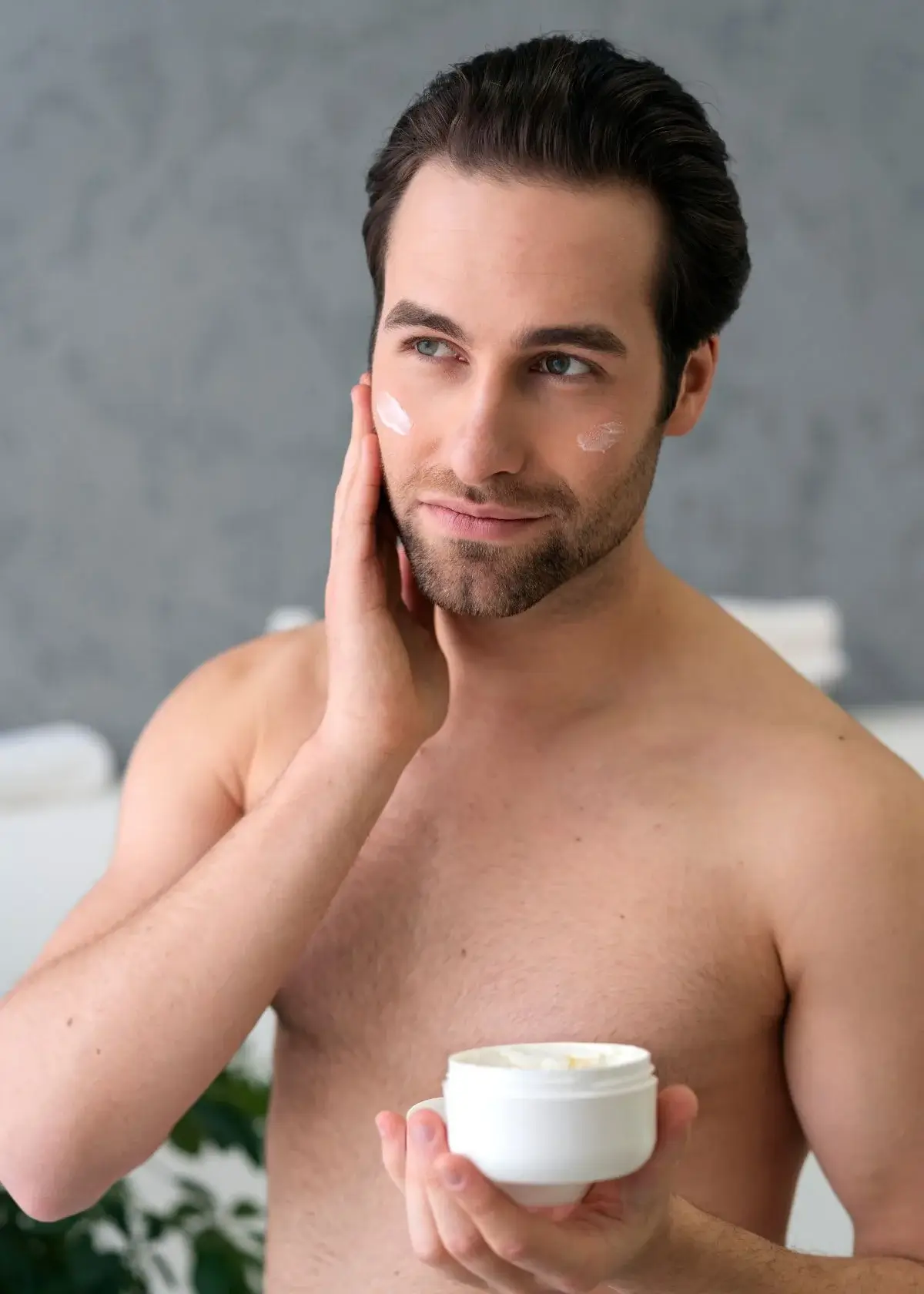As fashion-conscious men who love exposing their faces outdoors, sunscreen has become essential to our skincare routine. While most people know sunscreen as a lotion or cream that prevents sunburns, the science behind sunscreen is more complicated than that, especially regarding men's face sunscreen.
We will delve into the technicalities of SPF, UVA, UVB, and other terminologies you might have heard associated with sunscreen. We will also examine how sunscreens work on men's faces, the different types of sunscreen, and how to choose the best sunscreen for optimal UV protection. So, if you're ready to up your sunscreen game and know the science behind it, read on.
What is SPF, and what does it mean?
SPF stands for Sun Protection Factor, a rating system used to determine the sunscreen's effectiveness against UVB rays - the ones that cause sunburns. The higher an SPF rating, the better the protection against UVB rays. SPF 15 provides adequate protection for most people, while SPF 30 and higher offer the best protection.
However, it's important to note that the SPF rating only accounts for UVB protection, not UVA protection. UVA rays penetrate deep into the skin, causing premature aging, skin damage, and potentially skin cancer. So, you want to look for a broad-spectrum sunscreen with UVA and UVB protection.
How does sunscreen work?
Sunscreens are made up of two types of ingredients: organic and inorganic. Organic sunscreens contain carbon and act as filters, while inorganic sunscreens contain zinc oxide or titanium dioxide and act as physical blockers.
When sunlight hits the skin, it emits UV radiation that can penetrate the skin and cause damage to the cells. Sunscreens absorb or reflect UV radiation before penetrating the skin, protecting it from damage. A chemical reaction takes place, allowing the molecules to convert UV radiation into heat, which is then dissipated.
The best sunscreen for men's faces
Men's facial skin is prone to oil buildup, making the skin shiny and greasy. So, choose a breathable, lightweight, and oil-free sunscreen, preferably in a formula that's specially formulated for men's facial skin. You can also opt for tinted sunscreens, which can help even out skin tone, minimize blemishes, and provide other protection.
Consider the texture of the sunscreen. A creamy face sunscreen may be too heavy, while a watery one may not provide enough coverage. Choose one that's easy to apply, preferably in a lotion or spray formula, and blends effortlessly with your skin tone to avoid the dreaded white cast.
To wrap it up, sunscreen should be essential to your skincare routine. Understanding how sunscreen works is crucial in knowing which type of sunscreen to choose for optimal UV protection. Men's face sunscreen should be lightweight, oil-free, and breathable, with broad-spectrum protection against UVA and UVB rays. Don't forget to reapply every two hours, especially when you're outdoors, and wear protective clothing and hats for other sun protection. Stay safe and enjoy the outdoors in style!
Finding the correct products can be a game-changer when it comes to taking care of our skin. And if you're in the market for the best men's face sunscreen, you're in luck. After extensive research and reviewing, we've found a product that will become your new go-to. But don't just take our word for it. Click the link and discover for yourself why this sunscreen is a must-have for any man looking to protect his skin and look his best. Say goodbye to greasy, heavy formulas and hello to a lightweight, effective sunscreen that you'll love using every day.
What are the environmental impacts of certain sunscreen ingredients?
Certain sunscreen ingredients, like oxybenzone and octinoxate, have garnered attention due to their detrimental effects on marine environments. When washed off into oceans and other water bodies, these chemicals can lead to coral reef bleaching, disrupting delicate marine ecosystems. Besides, they have been linked to hormone disruption in aquatic life, further emphasizing their environmental impact. These minerals are considered reef-safe and less harmful to the environment, reducing the overall ecological footprint of sunscreen use and safeguarding marine biodiversity for future generations.

What is the significance of UVA and UVB protection in sunscreen?
Understanding the distinction between UVA and UVB rays is crucial for adequate sun protection. UVA rays, with longer wavelengths, penetrate deeper into the skin, contributing to premature aging and increasing the risk of skin cancer. UVB rays, with shorter wavelengths, primarily affect the skin's surface, causing sunburn and playing a role in skin cancer development. A broad-spectrum sunscreen provides comprehensive protection against both UVA and UVB rays. By prioritizing such sunscreens, you ensure your skin is shielded from the full spectrum of harmful ultraviolet radiation, reducing the risk of sun-related damage and maintaining healthier, more youthful-looking skin in the long run.

What are the benefits of using mineral-based sunscreens for men?
Mineral-based sunscreens, enriched with ingredients like zinc oxide or titanium dioxide, offer a range of advantages specially tailored for men's skincare needs. These formulations are renowned for their gentle nature, making them suitable for even the most sensitive skin types. Moreover, they are non-comedogenic, meaning they do not clog pores, reducing the likelihood of breakouts and promoting clearer, blemish-free skin. Mineral sunscreens also provide immediate protection upon application, eliminating the need for a waiting period before sun exposure.

How should men with facial hair apply sunscreen for full coverage?
Achieving comprehensive sun protection for men with facial hair requires some specific considerations. Opting for a spray or gel-based sunscreen can facilitate better penetration through the hair, ensuring even coverage of the underlying skin. Thoroughly massaging the product into the skin and using a comb or fingers to evenly distribute it helps reach all areas, ensuring no patchy spots are left unprotected. Choosing a lightweight, non-greasy formulation prevents residue build-up within the hair, ensuring a comfortable and non-irritating experience. By following these steps, men with facial hair can effectively safeguard their skin from harmful UV rays, promoting both skin health and well-groomed facial hair.

How can men benefit from the use of tinted or mattifying sunscreens?
Tinted sunscreens offer a multifaceted approach to skincare for men. Aside from their primary function of safeguarding against harmful UV rays, they provide a subtle tint that evens out skin tone. This can be particularly advantageous for those seeking a polished look without resorting to other cosmetic products, simplifying their grooming routine. Moreover, tinted sunscreens can help conceal minor imperfections, providing a natural, healthy complexion. Mattifying sunscreens, on the other hand, cater to individuals with oily or combination skin. They effectively regulate excess oil production, ensuring a matte finish without clogging pores. This leads to a fresh, shine-free complexion, making them an excellent choice for those with specific skin concerns, ultimately enhancing overall confidence and comfort in one's appearance.
Should I prioritize a certain SPF level over other sunscreen features?
While SPF level is a critical factor in sun protection, it's not the sole consideration. A well-rounded sunscreen should also offer broad-spectrum protection against UVA and UVB rays, ensuring comprehensive coverage. Water resistance is crucial for activities involving water or excessive sweating, providing prolonged protection. Besides, compatibility with your skin type is vital to prevent irritation or adverse reactions and promote skin health. For daily use, a sunscreen with an SPF of 30 or higher, combined with broad-spectrum coverage and suitability for your skin type, offers a balanced defense against UV radiation.







